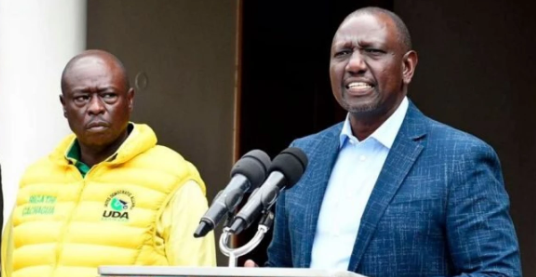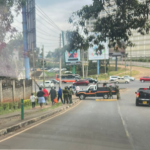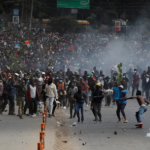President William Ruto denied on Sunday that the National Intelligence Service (NIS) failed to provide adequate intelligence before the youth-led anti-tax protests on Tuesday.
Speaking at State House during a presidential roundtable, he stated that the State had sufficient intelligence. He noted that intelligence reports indicated that criminal elements were planning to infiltrate Tuesday’s peaceful protests, which resulted in a dramatic raid on the August House.
“We had information, and that is why we prepared in the manner that we did, If we had not prepared, we would be counting different numbers of those who died,” President Ruto said.
“Criminals mobilised heavily; in fact, many peaceful protesters left town by 10 a.m. after realising criminals had joined the protests.”
President Ruto also disagreed with his deputy on the issue of extrajudicial killings, telling the roundtable that claims that they had resumed under his watch were false.
“It is not fair to discuss the deputy president here because he is not present to explain the context in which he said those things,” President Ruto stated.
When asked whether he had spoken with Gachagua about his claims of the return of killings, President Ruto asked the interviewers to direct their questions to Gachagua.
“I’m sure if you interview the deputy president he will answer that appropriately… but take it from me, extra-judicial killings will not be part of an administration that I’m part of,” he added.
Last week, shortly after announcing that his administration was dropping the widely-rejected Finance Bill 2024, President Ruto’s deputy called a media briefing, accusing Kenya’s spy agency of failing to provide sufficient intelligence.
According to Deputy President Gachagua, if NIS Director General Noordin Haji had properly informed President Ruto of the widespread public opposition to the Bill, Ruto would not have forwarded it to Parliament, thereby avoiding the nationwide protests that erupted on Tuesday, which culminated in protesters storming Parliament.
“People had to die, property was destroyed, and protests were held to let the President know how Kenyans felt, but there is an organisation funded by Kenyans to inform the president and the public about Kenyan sentiments.”
“Officers from the National Police Service (NPS) have told me in confidence that they did not receive advance intelligence briefs about the magnitude of the protests. Never have protesters invaded Parliament.”
Gachagua continued his tirade, harshly criticising Haji, claiming that he was unfit and lacked the qualifications for the top position in the NIS.
“When he (Haji) was appointed to the office of the Director General, he chased away all the people who were senior to him when he was in the service because of an inferiority complex, crippling NIS and making it dysfunctional,” he said.
“Three directors were chased away and reassigned to desk jobs across the government. 13 assistant directors, men and women with proven track records of intelligence and analysis, were removed from the NIS leaving a shell under a clueless Director General with no capacity to run the organisation. That is why the security sector was caught off guard by the intensity of the protests. Had Noordin Haji done his job; we would not be where we are today.”



